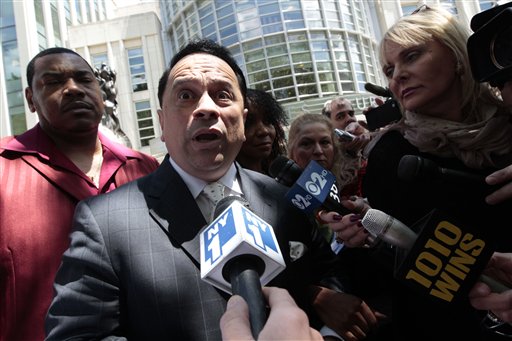

Sen. Pedro Espada speaks to reporters outside Brooklyn Federal court during a luch break, Friday, May 11, 2012 in New York. Espada is on trial with his son in Manhattan on charges of embezzlement during his Senate career. (AP Photo/Mary Altaffer)
A New York politician accused of looting money from his low-income health care network to fund a lavish lifestyle of fancy cars, dinners and birthday pony rides was convicted of embezzlement Monday.
Jurors were continuing to deliberate on four additional counts against Pedro Espada Jr., and on all counts against his son, Pedro Gautier Espada
The trial, which lasted nearly six weeks, was a landslide of paperwork that delved into the intricate financial dealings of the Bronx not-for-profit. Prosecutors introduced scores of checks, bank statements and credit card bills that they said detailed a secret scam in which the Espadas would pilfer funds out of Soundview Health Care Network by overcharging for cleaning fees paid to a separate company they also owned.
Prosecutors said the Espadas used the company as a personal ATM, spending on tickets to games and the theater, pony rides, birthday parties and fancy cars.
“The defendants took money meant for the poor, for health care, and put it in their own pockets,” Assistant U.S. Attorney Todd Kaminsky said in his closing argument.
Espada was at the center of the two most tumultuous years in the history of the state Senate and has described the 2010 indictment by the U.S. attorney’s office and then-state Attorney General Andrew Cuomo as a political “witch hunt.” The scandal cost him his Senate seat.
Espada started Soundview in 1978 in the South Bronx, which is located in one of the poorest counties in the U.S. In the past three decades, the clinic grew to include four centers that provide health care and social services. Espada’s son, Pedro Gautier, 38, grew up to run the business with his father.
Meanwhile, the health care network is struggling to stay open. The network is no longer able to accept Medicaid payments, the government-administered health care program for low-income people, which means there has been little money coming in. That decision is being appealed, said spokeswoman Rachel Fasciani, who said the network has more than 100,000 patient visits annually, and more than 200 people work there.
“In the meantime, our dedicated staff have been working steadfastly and without pay to care for our patients,” Fasciani said. “Our waiting room is full. The need is clear and it is our intent to continue to care for our community.”
During the trial, prosecutors argued that the Espadas took money that would have helped Soundview thrive; instead, the clinics had out-of-date machinery, major cash flow problems and few doctors available.
Espada’s attorneys argued that the clinics provided — and still do — excellent health care for people living in areas where they would otherwise have nothing available to them. The Espadas may have made a lot of money, but it was their company and they were allowed to do so, the attorneys argued.
“It’s not a crime to get paid for your work,” said one of lawyers, Susan Necheles. “It’s not a crime to do well in America.”
The 58-year-old Espada rose from a poor street fighter in Puerto Rico to a Fordham University graduate and boldly manipulated Albany’s old-boy political power structure in the Senate. Within days of his re-election in 2008, Espada formed his “three amigos” coalition with two other Democrats to threaten his own Democratic majority. He demanded leadership positions in part for what he said was a needed Latino voice, or the three would join Republicans and end the Democrats’ first majority in a half-century.
In June 2009, Espada and freshman state Sen. Hiram Monserrate of Queens, then under investigation in a domestic violence case that would later cost him his seat, carried out the threat. They joined the Republicans, with Espada gaining the title Senate president.
More than a month of gridlock ensued, with neither side recognizing the other’s authority — even holding simultaneous sessions at one point and locking each other out of the chamber. It ended when Democratic Gov. David Paterson appointed a lieutenant governor.
Copyright 2012 The Associated Press.



